2020届高考英语二轮复习 之必备词汇辨析(十二)
- 格式:doc
- 大小:78.50 KB
- 文档页数:14
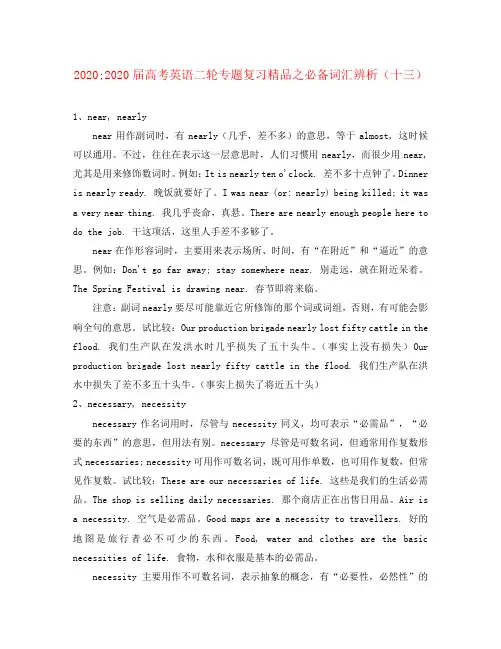
2020;2020届高考英语二轮专题复习精品之必备词汇辨析(十三)1、near, nearlynear用作副词时,有nearly(几乎,差不多)的意思,等于almost, 这时候可以通用。
不过,往往在表示这一层意思时,人们习惯用nearly,而很少用near,尤其是用来修饰数词时。
例如:It is nearly ten o'clock. 差不多十点钟了。
Dinner is nearly ready. 晚饭就要好了。
I was near (or: nearly) being killed; it was a very near thing. 我几乎丧命,真悬。
There are nearly enough people here to do the job. 干这项活,这里人手差不多够了。
near在作形容词时,主要用来表示场所、时间,有“在附近”和“逼近”的意思。
例如:Don't go far away; stay somewhere near. 别走远,就在附近呆着。
The Spring Festival is drawing near. 春节即将来临。
注意:副词nearly要尽可能靠近它所修饰的那个词或词组,否则,有可能会影响全句的意思。
试比较:Our production brigade nearly lost fifty cattle in the flood. 我们生产队在发洪水时几乎损失了五十头牛。
(事实上没有损失)Our production brigade lost nearly fifty cattle in the flood. 我们生产队在洪水中损失了差不多五十头牛。
(事实上损失了将近五十头)2、necessary, necessitynecessary作名词用时,尽管与necessity同义,均可表示“必需品”,“必要的东西”的意思,但用法有别。
necessary尽管是可数名词,但通常用作复数形式necessaries; necessity可用作可数名词,既可用作单数,也可用作复数,但常见作复数。
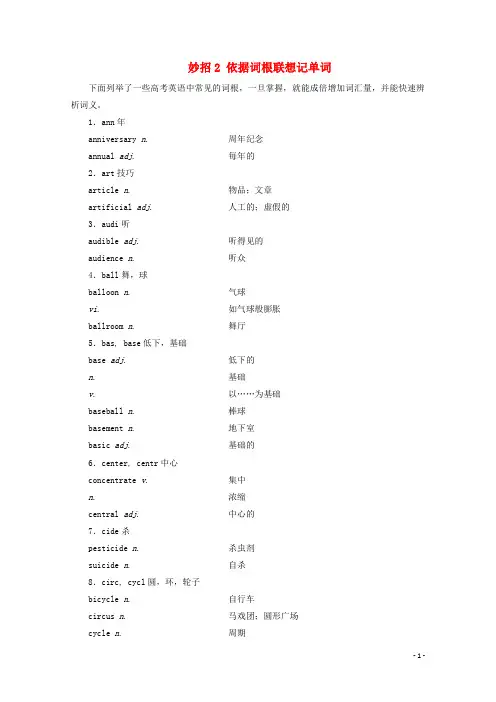
妙招2 依据词根联想记单词下面列举了一些高考英语中常见的词根,一旦掌握,就能成倍增加词汇量,并能快速辨析词义。
1.ann年anniversary n. 周年纪念annual adj. 每年的2.art技巧article n. 物品;文章artificial adj. 人工的;虚假的3.audi听audible adj. 听得见的audience n. 听众4.ball舞,球balloon n. 气球vi. 如气球般膨胀ballroom n. 舞厅5.bas, base低下,基础base adj. 低下的n. 基础v. 以……为基础baseball n. 棒球basement n. 地下室basic adj. 基础的6.center, centr中心concentrate v. 集中n. 浓缩central adj. 中心的7.cide杀pesticide n. 杀虫剂suicide n. 自杀8.circ, cycl圆,环,轮子bicycle n. 自行车circus n. 马戏团;圆形广场cycle n. 周期recycle v. 再循环;回收9.clar清楚,明白clarify v. 讲清楚;澄清declare v. 表明;声明10.clos, clud关闭close n. 关闭closet n. 壁橱;密室conclude v. 得出结论;终结disclose v. 揭发;泄露enclose v. 包围;围绕include v. 包含11.cord心accord v. 一致;符合record n.&v. 记录12.cre, creas增长,产生concrete adj. 具体的n. 混凝土creative adj. 有创造性的creature n. 生物;创造物decrease v. 减少increase v. 增加recreate v. 休养;再造recreation n. 娱乐;消遣13.duc, duct引导conduct n. 行为v. 指挥educate v. 教育;养育produce n. 农产品v. 生产product n. 产物;产品reduce v. 降低;减少14.fer带,拿ferry n. 渡口;渡船offer n.&v. 提供;提出prefer v. 更喜欢refer v. 提到;指点suffer v. 受苦;经受transfer v. 转移;转乘15.fin结束,范围finish v. 完成;结束final adj. 最终的n. 决赛16.flu流fluid n. 流体;液体fluent adj. 流利的influenza n. 流行性感冒(=flu) influence n.&v. 影响17.form形式,外形formal adj. 正式的;正规的inform v. 通知;告知reform n.&v. 改革;改造transform v. 转换;改变18.grad步,走,级gradual adj. 逐步的graduate n. 毕业生v. 毕业upgrade v. 上升;升级19.lev举,升elevator n. 电梯lever n. 杠杆20.lingu语言bilingual adj. 两种语言的linguist n. 语言学家21.loc地方local n. (本)当地人adj. (本)当地的;局部的location n. 位置,方位22.manu手manual adj. 手的;用手的manuscript n. 手稿23.memor记忆,记住的memorial n. 纪念日;纪念物memory n. 记忆24.mob, mot, mov移动mobile adj. 活动的;移动的motion n. 运动movable adj. 可移动的25.pon, pos放置position n. 位置postpone v. 推迟26.popul人民population n. 人口popular adj. 流行的;大众的27.prim第一,首要primary adj. 最初的primitive adj. 原始的28.sci知道science n. 科学conscious adj. 有知觉的29.sens, sent感觉sense n. 感觉sensitive adj. 敏感的sentiment n. 感情;情感30.spec看prospect n. 展望spectacle n. 场面;景象31.tail切,割retail n. 零售tailor n. 裁缝32.tain, ten, tin保持,握,容纳contain v. 容纳obtain v. 取得33.tend, tens, tent伸extend v. 伸开;扩展extensive adj. 广阔的extent n. 程度;长度34.tract拖,拉,吸引attract v. 吸引attractive adj. 有吸引力的contract v. 收缩n. 合同distract v. 分散注意力35.uni单独,单一union n. 联合;工会unite n. 统一;联合36.vac, van空,空虚vacation n. 假期vacancy n. 空位,空缺vanity n. 虚荣心37.vid, vis看见evident adj. 明显的visible adj. 可见的38.vit, viv生活,生存survive v. 幸存vital adj. 生死攸关的;至关重要的vitamin n. 维生素39.volv滚动involve v. 卷入revolve v. 旋转40.wis, wit知道wisdom n. 智慧witness v. 目击;见证。
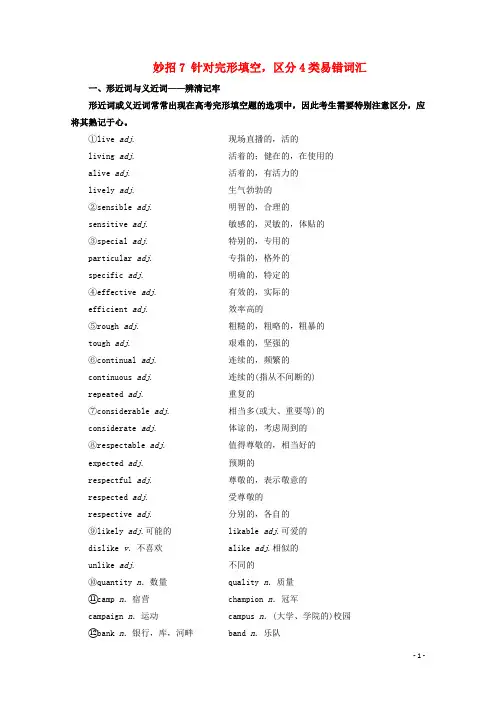
妙招7 针对完形填空,区分4类易错词汇一、形近词与义近词——辨清记牢形近词或义近词常常出现在高考完形填空题的选项中,因此考生需要特别注意区分,应将其熟记于心。
①live adj. 现场直播的,活的living adj. 活着的;健在的,在使用的alive adj. 活着的,有活力的lively adj. 生气勃勃的②sensible adj. 明智的,合理的sensitive adj. 敏感的,灵敏的,体贴的③special adj. 特别的,专用的particular adj. 专指的,格外的specific adj. 明确的,特定的④effective adj. 有效的,实际的efficient adj. 效率高的⑤rough adj. 粗糙的,粗略的,粗暴的tough adj. 艰难的,坚强的⑥continual adj. 连续的,频繁的continuous adj. 连续的(指从不间断的)repeated adj. 重复的⑦considerable adj. 相当多(或大、重要等)的considerate adj. 体谅的,考虑周到的⑧respectable adj. 值得尊敬的,相当好的expected adj. 预期的respectful adj. 尊敬的,表示敬意的respected adj. 受尊敬的respective adj. 分别的,各自的⑨likely adj.可能的likable adj.可爱的dislike v.不喜欢alike adj.相似的unlike adj. 不同的⑩quantity n.数量quality n.质量⑪camp n.宿营champion n.冠军campaign n.运动campus n.(大学、学院的)校园⑫bank n.银行,库,河畔band n.乐队bond n.关系brand n.品牌⑬ash n.灰烬cash n.现金crash v.碰撞⑭sigh v.& n.叹气signal n.信号v.发信号,表明sign n.标志,迹象v.签署⑮flight n.航班,飞行fright n.害怕frighten v.使惊吓fight v.&n.打架,打仗⑯advance v.& n. 前进,进步adventure n.冒险advertise v.做广告advantage n. 优点⑰biology n.生物,生物学biography n.传记⑱lie→lay→lain→lying 躺,位于lie→lied→lied→lying 撒谎lay→laid→laid→laying 下(蛋),产(卵),安放,搁delay→delayed→delayed→delaying推迟⑲star n.星stare v.凝视starve v.(使)挨饿⑳explain v.解释complain v.抱怨plain n.平原adj.平凡的,极普通的21offend v.冒犯defend v.防御○22rise v.上升raise v.提升,饲养○arise v.产生praise v.表扬arouse v. 激起23amaze v.使惊奇amuse v.(使)娱乐○24attract v.吸引attack v.攻击○25affect v.影响(主要指一时的影响,着重影响的动作,可指一般意义的影响,也可指○不良影响)effect n. 影响influence v.& n.影响(主要指对行为、性格、观点等产生间接的或潜移默化的影响)二、常考易混短语——对比识记以下是需要考生认真记忆的几组完形填空高频易混短语:①above all最重要的是in all总共②adjust (oneself) to (使……)适应……adapt ... for ... 把……改编成……③apply for申请apply to适用于④in addition另外in addition to除……以外(还)⑤at the cost of 以……为代价at all costs 不惜任何代价⑥carry out执行carry on继续做⑦check in登记check out结账离开⑧come across(偶然)遇见come to共计come out出现,出版come true实现,达到come round/around 苏醒come to life 变得活跃⑨in vain白费力气in return作为回报in turn轮流in detail详细地in common共有,公有in demand有需求的⑩rather than=instead of 而不是other than=except 除了⑪show off炫耀,卖弄show up如约赶到,出现⑫turn down拒绝turn to转向,求助于⑬break down 出故障,使分解(为) break in强行进入,打断break through突破⑭make sense 有道理,有意义make a difference 有作用/关系/影响make a (...) living 过(……的)生活⑮put aside储存,保留put away将……收起,积蓄put forward提出put off推迟,延迟put up with 容忍,忍受⑯in contrast对比起来on the contrary与此相反⑰draw in (列车等)到达,(天)渐黑draw near接近,靠近draw on凭借draw up 起草三、一词多义或熟词生义——强记生僻义以下是完形填空题中常考的多义词(生僻义项加黑标示):①fix v.安装,使固定;修理;确定②add v.加;继续说,补充说③apply v.申请;应用;涂,敷④reach v.到达;实现;伸手;与……取得联系⑤save v.拯救;储蓄;节约;避免⑥stand v.站立;忍受n.货摊;态度,立场⑦work v.工作;奏效;产生……作用;运行,运转⑧agree with同意;(与……)一致;适合⑨arm n.手臂v.武装⑩attend vt.&vi.出席;看护,照料⑪dear adj.亲爱的;昂贵的int.天哪⑫help v.帮助;避免,抑制⑬matter n.事情,问题,麻烦事;物质v.有关系,要紧⑭trick v.欺骗n.诡计;恶作剧;技巧,诀窍⑮pick up捡起;(车船)中途搭人;(不经意间)学会;增加⑯make up构成,组成;化妆;编造;和解四、常见障碍词汇——多查多记以下是篇章类材料中常常被考生忽视的词汇,需要特别关注。

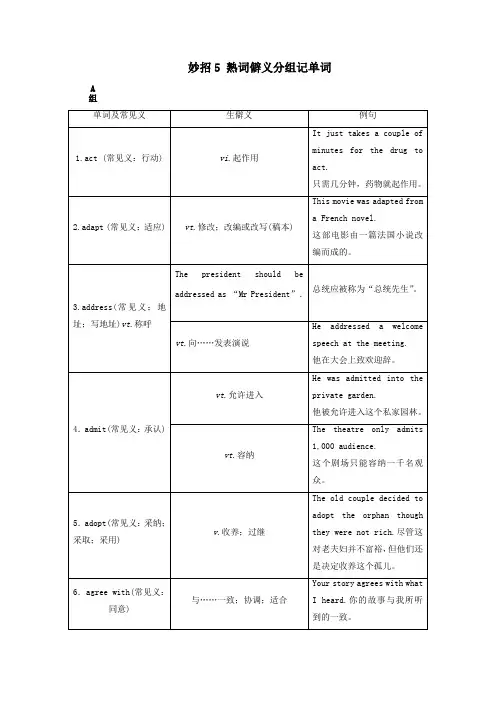
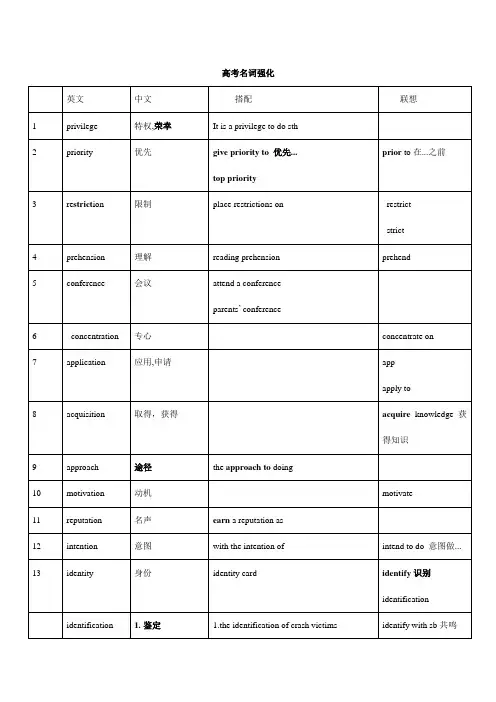
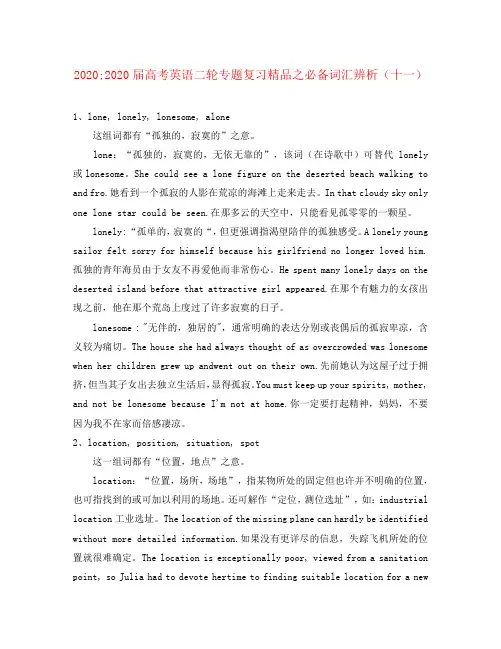
2020;2020届高考英语二轮专题复习精品之必备词汇辨析(十一) 1、lone, lonely, lonesome, alone 这组词都有“孤独的,寂寞的”之意。 lone:“孤独的,寂寞的,无依无靠的”,该词(在诗歌中)可替代lonely或lonesome。She could see a lone figure on the deserted beach walking to and fro.她看到一个孤寂的人影在荒凉的海滩上走来走去。In that cloudy sky only one lone star could be seen.在那多云的天空中,只能看见孤零零的一颗星。 lonely:“孤单的,寂寞的“,但更强调指渴望陪伴的孤独感受。A lonely young sailor felt sorry for himself because his girlfriend no longer loved him.孤独的青年海员由于女友不再爱他而非常伤心。He spent many lonely days on the deserted island before that attractive girl appeared.在那个有魅力的女孩出现之前,他在那个荒岛上度过了许多寂寞的日子。 lonesome : "无伴的,独居的",通常明确的表达分别或丧偶后的孤寂卑凉,含义较为痛切。The house she had always thought of as overcrowded was lonesome when her children grew up andwent out on their own.先前她认为这屋子过于拥挤,但当其子女出去独立生活后,显得孤寂。You must keep up your spirits, mother, and not be lonesome because I'm not at home.你一定要打起精神,妈妈,不要因为我不在家而倍感凄凉。 2、location, position, situation, spot 这一组词都有“位置,地点”之意。 location:“位置,场所,场地”,指某物所处的固定但也许并不明确的位置,也可指找到的或可加以利用的场地。还可解作“定位,测位选址”,如:industrial location工业选址。The location of the missing plane can hardly be identified without more detailed information.如果没有更详尽的信息,失踪飞机所处的位置就很难确定。The location is exceptionally poor, viewed from a sanitation point, so Julia had to devote hertime to finding suitable location for a new school.从卫生角度来看,这个地段非常糟糕,所以朱利亚不得不花时间找一处适于建新学校的地点。 position:“方位,地点,位置”,通常是指某物所处的实际或相对的位置,适用于具体及抽象的事物,想象中或实际存在的东西;因此还可解作“社会地位,职务,见解,立场,姿态”等。Can you show me the position of the school on the map?你能指给我那学校在地图上的位置吗?Before the invention of the timing devices they told the time by the position of the sun.在计时器发明之前,他们根据太阳的位置来判断时间。 situation:“地点,位置,场合”,它所指的地点更注重考虑周的环境,还指抽象的对某人或社会有影响的条件、事实、事件的总和,因此可以解作“境况、形势、局势、处境”等。常用短语:cope/ do with the situation应付当前情况:save the situation挽回局势。Despite the fact that he's only a boy of nine, he could manage to deal with the new situation.尽管他还是个九岁的小男孩,他却能设法对付新情况。The situation of the camp was chosen with respect to its healthfulness and its nearness to thecity.这个营地位置的选择考虑到了有益于健康而且离城市近的原则。 spot:“地点,现场”,指范围清楚的特定地点,也可指事件或行为的发生地,具有较强的“有限空间意义”,如:a historic/ scenic spot古迹/ 风景名胜。常用词组:on the spot 当场。She was probably mad with hunger and thirst in that lonely hot spot.在那炎热孤寂的地方,她很可能因为又饿又渴而几近发疯。The police were on the spot within a few minutes of hearing about the crime.获悉该项犯罪后几分钟,警察即赶到现场。 3、later, latter later是late的比较级形式,意为“后来的(地)”,通常用在表示时间单位的词组后,表示“……以后”的意思,此外还通常用在一些习语中。例如:Two days later, we proved these facts to be correct. 两天以后,我们证明了这些事实是正确的。He reached the stations 5 minutes later. 他晚到车站五分钟。sooner or later 总有一天,迟早later on 今后,以后 latter是一原级形容词,主要有三种意义:1).表示“后面的,后半的,末了的”之意;2).与定冠词the连用,表示“后者”,与the former相对;3).“最近的,现今的”。例如:the latter half of the month 后半月,下半月the latter part of the year 一年中后一段时期Of the two the latter is far better than the former.两者中后者比前者好得多。He has been at home in these latter days.在最近的这些日子里,他一直呆在家里。 4、lay, lie 这两个动词在变形时,往往引起混淆。 lay主要用作及物动词,基本意思为“放”,还可有一些引申意义。它的过去式和过去分词是laid,现在分词是laying。例如:Please lay the book on the table.请把书放在桌上。The road is laid with asphalt.这条路是用柏油铺成的。These hens lay eggs every day.这些母鸡天天下蛋。We should lay stress on our pronunciation.我们应该重视我们的发音。 lie是一个不及物动词,它有两种意义和用法:1).意为“平躺;平放;位于”时,过去式为lay, 过去分词为lain; 2).意为:“撒谎”时,过去式和过去分词是lied。例如:Don't lie in bed all morning.不要一早上都躺在床上。He lay on the grass enjoying the sunshine.他躺在草地上享受阳光。Korea lies to the east of China.朝鲜位于中国东面。You are lying.你在撒谎。He lied to me.他对我撒谎。 5、leave out, leave off 这两个短语动词由leave加副词构成,在句中均作谓语,它们的意义有区别。 leave out主要有下列几种意义:1).省去,略去;2).遗漏;3).没有考虑到。例如:We must decide what to leave out and what to leave in. 我们必须决定取舍。Please complete this check properly. The date has been left out. 请将这张支票填完整,日期被漏掉了。We left out the possibility of his coming. 我们没考虑到他会来。 leave off则主要表示下列两种意义:1).停止,中断;2).不再穿,不再使用。例如:Leave off talking!别讲话了!They leave off work at 4:30 p.m. 他们下午四点半下班。It is warm enough for you to leave off your woolen sweater. 天这么热,可以脱下你的绒线衣了。 6、living, alive, live, lively 这四个形容词均是live派生出的,但它们的意义和用法均不一样。 living有三种意义和用法:1).表示“活着的,尤指现存的”,可以指人,也可指物。在句中作表语或定语;作定语时,可前置也可后置。2).表示某人,某物与另一个人或一物“一模一样,逼真的”之意。3).相当于形容词lively,表示“强烈的、活泼的”之意。例如:A living language should be learned orally. 一种活的语言应该通过口语来学习。No man living could do better. 当代的人没有一个能做得比这好的了。Shelly was still living when Keats died. 济慈死时,雪莱还活着。He's the living image of his father. 他跟他父亲长得一模一样。We have a living hope that you will succeed. 我们强烈地希望你成功。 alive多用作表语,多用于人,表示“活着的”的意思,还可引申为其他意义;间或也作定语,只能放在被修饰词的后面。例如:Is she still alive?她还活着吗?They are the happiest children alive.他们是当代最幸福的孩子们。An enemy officer was caught alive.一名敌军官被活捉了。The lake is alive with fish.湖里鱼多得很。 live作形容词时读作/laiv/, 只用于物,作定语,基本意义是“活的”,这时可用living替代。它还有很多引申意义。例如:This is a live fish/ mouse.这是一条活鱼(一只活老鼠)。Don't play with live coals!不要玩燃烧着的煤块。A live wire is dangerous.通上电的电线很危险。It was a live broadcast, not a recording.那是实况广播,不是录音广播。 lively读作/laivli/,在句中可作表语或定语,主要表示下列三种意义:1).有生气的,活泼的,快活的;2).(颜色)鲜明的;3).生动的,真实的。例如:She is as lively as a kitten.她快活得像只小猫。The patient seems a little livelier this morning.那病人今晨似乎好些了。He has lively imagination.他有丰富的想
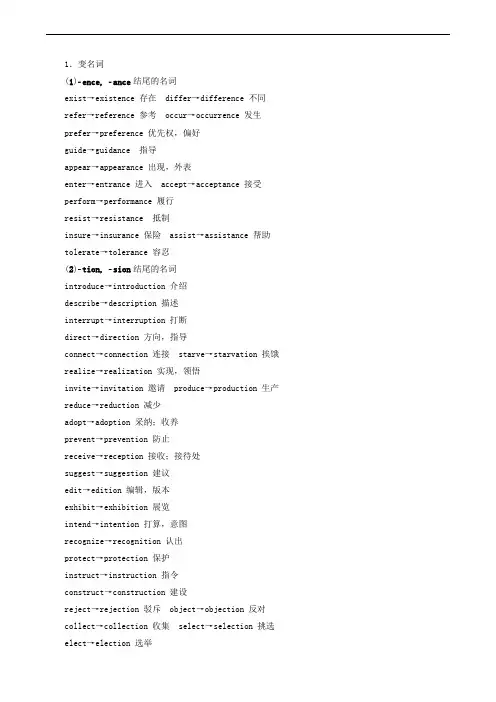
1.变名词(1)ence, ance结尾的名词exist→existence 存在differ→difference 不同refer→reference 参考occur→occurrence 发生prefer→preference 优先权,偏好guide→guidance 指导appear→appearance 出现,外表enter→entrance 进入accept→acceptance 接受perform→performance 履行resist→resistance抵制insure→insurance 保险assist→assistance 帮助tolerate→tolerance 容忍(2)tion, sion结尾的名词introduce→introduction 介绍describe→description 描述interrupt→interruption 打断direct→direction 方向,指导connect→connection 连接starve→starvation 挨饿realize→realization 实现,领悟invite→invitation 邀请produce→production 生产reduce→reduction 减少adopt→adoption 采纳;收养prevent→prevention 防止receive→reception 接收;接待处suggest→suggestion 建议edit→edition 编辑,版本exhibit→exhibition 展览intend→intention 打算,意图recognize→recognition 认出protect→pr otection 保护instruct→instruction 指令construct→construction 建设reject→rejection 驳斥object→objection 反对collect→collection 收集select→selection 挑选elect→election 选举conserve→conservation 保护observe→observation 观察organize→organization 组织examine→examina tion 考试determine→determination 决定form→formation 形成inform→information 通知imagine→imagination 想象transport→transportation 运输expect→expectation 期待adapt→adaptation 改编;适应prepare→preparation 准备explore→exploration 探索consider→consideration考虑declare→declaration 宣布decorate→decoration 装饰inspire→inspiration 激发,灵感relax→relaxation 放松,休闲communicate→communication 交流occupy→occupation 占用;职业satisfy→satisfaction 满足apply→application 申请,应用recommend→recommendation 推荐combine→co mbination 结合operate→operation 操作;手术hesitate→hesitation 犹豫educate→education 教育locate→location 定位indicate→indication 指出participate→participation参加appreciate→appreciation 欣赏,感激associate→association 联想;协会separate→separation 分离investigate→investigation调查celebrate→celebration 庆祝congratulate→congratulation 祝贺translate→translation 翻译accelerate→acceleration 加速donate→donation 捐赠liberate→liberation 解放motivate→motivation 动力concentrate→concentration 集中contribute→contribution 贡献di stribute→distribution 分发promote→promotion 促进devote→devotion 致力frustrate→frustration 沮丧divide→division 分配decide→decision 决定discuss→discussion 讨论depress→depression 沮丧impress→impression 印象express→expression 表达possess→possession 拥有;财产expand→expansion 扩大extend→extension 延伸admit→admission 承认permit→permission 允许conclude→conclusion 结论explode→explosion 爆炸confuse→confusion 迷惑(3)ment结尾的名词amaze→amazement 惊奇improve→improvement改进achieve→achievement 完成agree→agree ment 同意arrange→arrangement 安排employ→employment 雇佣advertise→advertisement 广告astonish→astonishment 吃惊announce→announcement 通告assess→assessment 评估develop→development 发展disappoint→disappointment失望encourage→encouragement鼓舞entertain→entertain ment 款待,娱乐equip→equipment 装备govern→government 统治;政府manage→management 管理punish→punishment 惩罚require→requirement 要求settle→settlement 协议;定居处state→statement 说明;陈述treat→treatment 对待;治疗accomplish→accomplishment 成就;完成(4)ness结尾的名词eager→eagerness 渴望kind→kindness 友好happy→happiness 幸福lonely→loneliness 孤独quiet→quietness 安静careless→carelessness 粗心aware→awareness 意识bitter→bitterness 苦blind→blindness 盲目calm→calmness 冷静clever→cleverness 聪明fair→fairness 公平f oolish→foolishness 愚蠢fit→fitness 适合;健康ill→illness 疾病lazy→laziness 懒惰sad→sadness 悲伤sweet→sweetness 甜美thick→thickness 厚度tired→tiredness 累cold→coldness 寒冷;冷淡nervous→nervousness 惶恐不安homesick→homesickness 思乡helpless→helplessness 无助hopeless→hopelessness 无望(5)age结尾的名词marry→marriage 婚姻store→storage 储存short→shortage 短缺pack→package 包裹pass→passage 通道(6)th结尾的名词warm→warmth 温暖true→truth 真理dead→death 死亡grow→growth 成长(7)ure结尾的名词please→pleasure 快乐fail→failure 失败mix→mixture 混合press→pressure 压力depart→departure 离开expose→exposure 暴露sign→signature 签名(8)ce结尾的名词absent→absence 缺席confident→confidence 自信different→difference 不同evident→evidence 证据patient→patience 耐心 sil ent→silence 沉默advise→advice 建议present→presence 出席convenient→convenience方便diligent→diligence 勤奋distant→distance 距离important→importance 重要independent→independence 独立innocent→innocence 天真,无辜intelligent→intelligence 智力violent→viol ence 暴力(9)dom结尾的名词free→freedom 自由wise→wisdom 智慧(10)hood结尾的名词child→childhood 孩童时期neighbor→neighborhood 邻里boy→boyhood 少年时代(11)ship结尾的名词friend→friendship 友谊leader→leadership 领导才能owner→ownership 所有权relation→relationship 关系har d→hardship 艰难(12)ing结尾的名词train→training 训练find→finding 发现suffer→suffering 痛苦greet→greeting 问候paint→painting 绘画farm→farming 农业warm→warming 变暖mean→meaning 意思cross→crossing 十字路口belong→belongings 财产shoot→shooting 射击 f eel→feeling 情感;感觉2.变形容词(1)y结尾的形容词sun→sunny 阳光灿烂的health→healthy 健康的dirt→dirty 脏的wealth→wealthy 富有的greed→greedy 贪婪的taste→tasty 美味的rain→rainy 多雨的wind→windy 有风的snow→snowy 被雪覆盖的storm→stormy 有暴风雨的fog→foggy 多雾的ice→icy 冰冷的mud→muddy 泥泞的dust→dusty 布满灰尘的smell→smelly 臭的salt→salty 咸的(2)al,ial结尾的形容词culture→cultural 文化的agriculture→agricultural 农业的practice→practical 实际的music→musical 音乐的globe→global 全球的condition→conditional有条件的environment→environmental环境的chemistry→chemical 化学的medicine→medical 医学的origin→original 原始的politics→political 政治的emotion→emotional 感情的;有感染力的nation→national 国家的nature→natural 自然的person→personal 个人的occasion→occasional 偶尔的mind→mental 精神上的physics→physical 身体上的accident→accidental 偶然的education→educational 教育的technique→technical 技术上的race→racial 种族的type→typical 典型的benefit→beneficial 有益的face→facial 面部的industry→industrial 工业的finance→financial 金融的(3)ful,less结尾的形容词thank→thankful 感激的success→successful 成功的peace→peaceful 和平的beauty→beautiful 美丽的faith→faithful 忠实的joy→joyful 高兴的cheer→cheerful 高兴的use→useful→useless 有用的/无用的pain→painful→painless痛苦的/无痛的harm→harmful→harmless有害的/无害的power→powerful→powerless强有力的/无力的car e→careful→careless小心的/粗心的color→colorful→colorless 多彩的/无色的hope→hopeful→hopeless抱有希望的/无望的help→helpful→helpless有帮助的,愿意帮忙的/无助的meaning→meaningful→meaningless 有意义的/无意义的speech→speechless 说不出话的end→endless 无休止的home→homeless 无家可归的job→jobless 无业的 s elf→selfless 无私的aim→aimless 无目标的price→priceless 珍贵的,无价的breath→breathless 上气不接下气的(4)(i)ous结尾的形容词adventure→adventurous冒险的danger→dangerous 危险的caution→cautious 小心的poison→poisonous 有毒的mountain→mountainous 多山的ambition→ambitious 有野心的ne rve→nervous 紧张的religion→religious 宗教的(5)able,(s)ible结尾的形容词avoid→avoidable 可避免的forget→forgettable 可忘记的comfort→comfortable 舒服的believe→(un)believable (不)可信的rely→reliable 可靠的enjoy→enjoyable 令人愉快的value→valuable 有价值的suit→suitable 合适的bear→bearable 可忍受的afford→affordable 支付得起的adapt→adaptable 适应力强的renew→renewable 可更新的port→portable 便携的change→changeable 多变的reason→reasonable 合理的access→(in)accessible (不)可接近的(6)tive结尾的形容词create→creative 有创造力的attract→attractive迷人的protect→protective 保护的talk→talkative 健谈的instruct→instructive 有教育意义的effect→effective 有效的produce→productive 多产的relate→relative 相关的compete→competitive 有竞争力的(7)tic,fic结尾的形容词system→systematic 系统的romance→romantic 浪漫的sympat hy→sympathetic有同情心的energy→energetic 精力充沛的science→scientific 科学的(8)en结尾的形容词wood→wooden 木制的gold→golden 金色的wool→woolen 羊毛的(9)some结尾的形容词hand→handsome 英俊的awe→awesome 令人敬畏的trouble→troublesome 令人烦恼的tire→tiresome 烦人的(10)ly结尾的形容词de ad→deadly 致命的live→lively 活跃的friend→friendly 友好的month→monthly 每月的cost→costly 昂贵的order→orderly 有秩序的love→lovely 可爱的year→yearly 每年的week→weekly 每周的3.变副词(1)形容词词尾直接加ly变副词real→really 真正地helpful→helpfully 有帮助地careful→carefull y 细心地hopeful→hopefully 有希望地slow→slowly 慢慢地quick→quickly 快速地quiet→quietly 安静地rude→rudely 无礼地polite→politely 有礼貌地wide→widely 宽阔地fortunate→fortunately幸运地(2)以辅音字母加y结尾的形容词要变y为i,然后再加lybusy→busily 繁忙地angry→angrily 生气地easy→easi ly 容易地healthy→healthily 健康地happy→happily 高兴地heavy→heavily 沉重地noisy→noisily 吵闹地(3)某些以辅音字母加不发音的字母e结尾和以ue结尾的形容词要先去掉e,然后再加y或ly terrible→terribly 可怕地true→truly 真正地gentle→gently 温柔地simple→simply 简单地possible→possibly 可能地comfor table→comfortably 舒服地4.变动词(1)en结尾的动词dark→darken 变暗quick→quicken 加快sharp→sharpen 削尖loose→loosen 松开soft→soften 软化worse→worsen 恶化light→lighten 减轻,变亮broad→broaden 加宽weak→weaken 削弱tight→tighten 变紧bright→brighten 使更明亮bl ack→blacken 变黑short→shorten 缩短adj. →n. →v.deep→depth→deepen 加深long→length→lengthen加长wide→width→widen 加宽high→height→heighten 加强,提高strong→strength→strengthen 加强(2)en前缀的动词able→enable 使能够large→enlarge 使扩大danger→endanger 使……遭受危险sure→ensure 保证(3)e结尾的动词(注意发音变化)bath→bathe 洗澡breath→breathe 呼吸cloth→clothe 给……穿衣5.变否定(1)in,im/il,iractive→inactive 不活跃的experienced→inexperienced 缺乏经验的complete→incomplete 不完整的dependent→independent 独立的significant→insignificant 不重要的capa ble→incapable 无能力的proper→improper 不合适的appropriate→inappropriate 不合适的accurate→inaccurate 不精确的correct→incorrect 不正确的expensive→inexpensive 不贵的formal→informal 非正式的;随便的convenient→inconvenient 不方便的direct→indirect 间接的mature→immature 不成熟的patient→impatient 不耐烦的perfect→imperfect 不完美的possible→impossible 不可能的polite→impolite 不礼貌的logical→illogical 不合逻辑的legal→illegal 不合法的regular→irregular 不规则的responsible→irresponsible 不负责的(2)unusual→unusual 不寻常的easy→uneasy 不安的fa ir→unfair 不公平的real→unreal 不真实的conscious→unconscious 不知道的certain→uncertain 不确定的popular→unpopular 不受欢迎的common→uncommon 不普通的pleasant→unpleasant 不愉快的important→unimportant 不重要的necessary→unnecessary 不必要的successful→unsuccessful 不成功的noticed→un noticed 没被注意的tidy→untidy 不整洁的reasonable→unreasonable 不合理的finished→unfinished 未完成的done→undone 未完成的dress→undress 脱衣fold→unfold 打开load→unload 卸车lock→unlock 开……的锁freeze→unfreeze 解冻earth→unearth 出土,挖掘cover→uncover 揭露(3)disap pear→disappear 消失courage→discourage 使泄气close→disclose 揭露cover→discover 发现agree→disagree 不同意approve→disapprove 不同意obey→disobey 不服从honest→dishonest 不诚实的satisfied→dissatisfied 不满意的advantage→disadvantage弱点order→disorder紊乱(4)mislead→mislead 误导leading→misleading 误导的understand→misunderstand 误解understanding→misunderstanding 误解use→misuse 滥用spell→misspell 拼错trust→mistrust 不信任。
2020;2020届高考英语二轮专题复习精品之必备词汇辨析(十二)1、make...from, make...of, make...into, make upmake...from为“用...原料制成”,介词的宾语是原材料,用from表示从制成品上看不出原来的制作材料。
例如:They make wine from grapes. 他们用葡萄为原料制成葡萄酒。
This cake is made from corn. 这个蛋糕是以玉米为原料制成的。
make...of为“用...材料制成”,介词的宾语是某种材料,用of表示从制成品上可以看出原来的材料。
例如:Nearly everything inside the room is made of bamboo. 屋子里的东西几乎都是用竹子制成的。
This big box is made of wood. 这个大盒子是由木头制成的。
make...into为“把...做成”,动词的宾语是某种原料和材料,介词into的宾语是制成品。
例如:They make milk into butter and cheese. 他们把牛奶制成白脱和奶酪。
Can you make this material into a skirt?你能把这布料制成一件衬衫吗?比较make...into与make...from, make...of的区别:Flour is made from wheat. 面粉是小麦制成的。
Wheat can be made into flour. 小麦可制成面粉。
Bottles are made of glass. 瓶子是用玻璃制成的。
Glass can be made into bottles. 玻璃可制成瓶子。
make up为“构成,组成”,主语为构成一个整体的各个个体,宾语是一个集合体。
此结构用于被动语态时,需加介词of,构成be made up of短语。
例如:Ten doctors make up a visiting team. 十位医生组成了一支访问团。
A car is made up of many different parts. 一辆汽车是由许多不同的零件组成的。
Life is made up of both sweetness and sorrow. 生活中既有甘,又有苦。
2、main, chief, major这三个词都有“重要的”之意。
main:“主要的”,只用于物,强调事物的某一部分、分支的重要性,大小及潜力优于其他部分、分支,或表示该部分在整个事物中占有显赫的地位。
This article has in the main preserved the fairness of news reporting.该文章大体上保留了新闻报道所用的不偏不倚的风格。
His main reason for going to the library was to look up the book he spoke of yesterday.他到图书馆去的主要原因是去找他昨天谈到的那本书。
major:“重大的,主要的”,指在规模,数量,重要性方面超出同类的其他事物。
John has also played a major part in the improvement of the paper.约翰在改进这份报纸的工作中也起了较大的作用。
It was not until late afternoon that he began to tackle the major problem.直到傍晚,他才开始处理重大问题。
chief: "主要的,首要的",强调在顺序,等级,重要性,价值方面高于其他所有同类事物,用于人时指 "地位最高",用于物,意为 "最重要的"。
The chief engineer is the most important of a group of engineers in a job. He is highest in rank and probably in pay.总工程师是参加一项工作的一组工程师中首要的一个,他的级别是最高的,薪水也可能是最高的。
The chief reason for the great changes in the cultural field is the development of economy.经济发展是文化领域内发生巨大变化的主要原因。
3、material, matter, substance这三个词组都可作“物质,材料”讲。
material:“物质,物资,材料”,一般指具物理成份,构成某具体物体的物质,尤指人造物品的制作材料;有时则引申为现实观念或现实的根据或基础。
如:raw material原材料,指能够进一步加工的物质,也指可以被进一步利用的事件,观念等,例如用作文学素材。
With the development of industry, the consumption of raw material by industry has been rising surprisingly.随着工业的发展,工业所消耗的原材料增长惊人。
They discovered that they could weave the wool into the material, which can be made into warm coats and suits.他们发现可以把羊毛纺成衣料,再把衣料制成暖和的外套和西装。
matter:“物质,内容”,基本上指某种实体或构成所有客观事物的“物质”,与精神相对;也指与形式相对的“内容”。
常用短语:a matter of course 理所当然的事, matter-of-fact 讲求实际的。
The matter in your composition is quite good, but the writing is not lucid enough.你的作文内容很好,但文字不够清楚。
We know nothing about force or energy, nor of any physical phenomenon, except through the agency of matter. 要是不通过物质这个媒介,我们对力或能会一无所知,更不会了解任何物理现象。
substance:“物质,东西",常指具有某种物理或化学性质的特殊物质,或指构成某物,并赋予某种特性的物质;还可指“重要的”或“实际性的”内容。
常用短语:a question of substance 实质性问题;have substance 有道理,有根据,有内容。
The function of the root of a plant is to fix the plant in its place and to take in water and food substance present in the earth.植物根的功能是将植物固定在所处的位置,并从土壤中吸收水及营养物质。
A good chemical laboratory is equipped with precision instruments and supplies of many chemical substances. 一个好的化学实验室应配有精密仪器,并有充足的各种化学物质供应。
4、maybe, possibly, perhaps, probably这四个词都可表示“可能性”。
maybe:“可能,也许”,比其余的几个词更为随便和不正式,可能性不大,也可以表示一种非常委婉,礼貌的建议或要求。
如:You could put it over there, maybe. 也许你可以把它搁在那边。
He didn't feel quite right; maybe he got sunstroke. 他觉得不太好;也许是有点中暑。
The doctor thinks maybe we'd better have a minor operation. 医生认为也许我们最好做个小手术。
possibly:“可能地,或者,也许",可能性较大。
用于否定句和疑问句时表示"无论如何"之意。
She expressed regret for any inconvenience which might possibly be caused.她为任何可能造成的不便而深表歉意。
I couldn't possibly have finished typing such a long document in such a limited period of time. 无论如何,我也不可能在如此有限的时间内打完这么长的文件。
perhaps:“可能”,较为常用也较为正式的词,可能性也不十分大。
它可以表示建议或要求,也可以表示以礼貌的方式下命令。
I thought perhaps it was the letter you had been expecting. 我想这大概是你一直盼望的那封信。
Perhaps you will kindly give us a hand when we are in trouble. 当我们陷入困境时,也许你会善意地帮我们一把。
probably:“很可能,大概”,可能性在这一组词中最大,表示一种几乎完全肯定的意思。
He is the only witness of the accident; he can probably give us some detailed information about it. 他是这次事故唯一的目击者,他大概可以告诉我们一些详细情况。
There is probably some kind of living matter on some other worlds, but we do not know yet. 很可能在其他的世界存在着另类的生物,只是我们尚不知道。
5、mean, intend, propose这组词都有“打算,有心做某事”之意。
mean:“打算,想象,有...意图”,不如intend正式,强调心里想做的意思,但不强调决心。
短语: mean...for 准备让...做...Everyone believed that it would be a very suitable match because John and Julia were obviously meant for each other. 每个人都认为他们的结合会很般配,因为约翰和朱利亚显然天生一对。